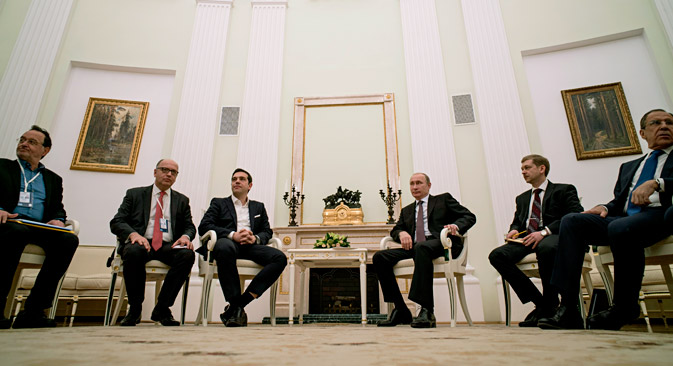
Greek Prime Minister Alexis Tsipras (3rd left) met Russian President Vladimir Putin (3rd right) in Moscow on April 7. Source: Press Photo
The business daily Vedomosti sums up the meeting of Russian President Vladimir Putin and Greek Prime Minister Alexis Tsipras. The newspaper notes that Tsipras’ visit to Moscow has provoked a mixed reaction in the EU; the visit was considered ill-timed and concern was expressed that Greece would try to obtain support for its economy and make a deal with Moscow, breaking with Brussels' unified sanctions policy.
President of the European Parliament Martin Schulz directly warned the Greek prime minister against such steps, noting that the EU expected that during his visit to Moscow, he would conduct himself in accord with his position as the leader of the government of a country that is a member of the European Union, the newspaper adds.
Responding to criticism, Tsipras noted that Greece as a sovereign state is exercising its right to implement a multi-dimensional foreign policy, writes Vedomosti. The warm welcome afforded to the Greek prime minister, known to be critical of Western sanctions against Russia, was appropriate, while the accusations against Moscow of attempts to destroy the EU were far from reality, said Sergei Fyodorov of the Institute of Europe at the Russian Academy of Sciences, in comments to the newspaper.
The new U.S. Secretary of Defense, Ashton Carter, is on his first tour to the Far East, the business daily Kommersant reports. According to the newspaper, the trip serves the purpose of the strengthening of military-technical cooperation with the United States’ key Pacific allies, Japan and South Korea. Ahead of his tour, Carter stressed the importance of developing relations with the Asia-Pacific region, as well as the intention of the U.S. to continue to invest in the region's security. One way to achieve this goal should be to increase U.S. investment in joint projects with Japan and South Korea, the newspaper reminds us.
According to Kommersant, the strengthening of cooperation between Washington and Seoul and Tokyo will also affect the prospects of their relations with Moscow. "Tokyo has significantly toughened its stance toward Moscow over the Ukrainian events,” Ruslan Pukhov, director of the Center for Analysis of Strategies and Technologies, told Kommersant. “In turn, the United States intends to contribute to the strengthening of this trend in the policy of Japanese Prime Minister Abe.”
"As for Seoul, it is developing military-technical cooperation with Moscow and showing an interest in Russian technologies. But prospects of bilateral cooperation between Russia and South Korea are becoming foggier after the visit of Mr. Carter,” said Pukhov.
First Minister of Scotland Nicola Sturgeon has said that if her Scottish National Party (SNP) wins in the May parliamentary elections, another referendum on the independence of the region will be held in 2016, the centrist newspaper Nezavisimaya Gazeta reports.
The newspaper reminds its readers that Sturgeon, who has replaced Alex Salmond as leader of the SNP, said in November 2014 that her main goal in her new position would be a second attempt to hold a vote on leaving the United Kingdom.
Nezavisimaya Gazeta does not exclude the possibility that Scotland really will leave the UK. So far, pre-election polls predict success and an absolute majority in the regional parliament for supporters of Scottish sovereignty; the number of voters willing to support the SNP has increased significantly, and the party has a chance of winning the election on May 7.
According to the polls, Scottish nationalists are expected to take from 35 to 50 seats out of 59 in the regional parliament, despite the fact that neither British Prime Minister and Conservative leader David Cameron, nor Labour leader Ed Miliband can count on an absolute majority, the newspaper writes. Observers see the British general election, which is less than a month away, as one of the most unpredictable in history since the influence of fringe parties is quite high, Nezavisimaya Gazeta adds.
All rights reserved by Rossiyskaya Gazeta.
Subscribe
to our newsletter!
Get the week's best stories straight to your inbox